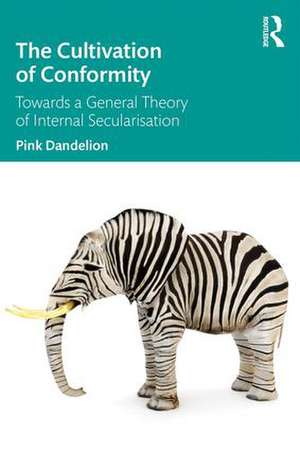The Cultivation of Conformity: Towards a General Theory of Internal Secularisation
Autor Pink Dandelionen Limba Engleză Paperback – 13 mai 2019
| Toate formatele și edițiile | Preț | Express |
|---|---|---|
| Paperback (1) | 363.00 lei 6-8 săpt. | |
| Taylor & Francis – 13 mai 2019 | 363.00 lei 6-8 săpt. | |
| Hardback (1) | 998.83 lei 6-8 săpt. | |
| Taylor & Francis – 24 apr 2019 | 998.83 lei 6-8 săpt. |
Preț: 363.00 lei
Nou
Puncte Express: 545
Preț estimativ în valută:
69.46€ • 75.69$ • 58.53£
69.46€ • 75.69$ • 58.53£
Carte tipărită la comandă
Livrare economică 23 aprilie-07 mai
Preluare comenzi: 021 569.72.76
Specificații
ISBN-13: 9781138740198
ISBN-10: 1138740195
Pagini: 190
Ilustrații: 6 Tables, black and white; 2 Line drawings, black and white
Dimensiuni: 156 x 234 x 10 mm
Greutate: 0.29 kg
Ediția:1
Editura: Taylor & Francis
Colecția Routledge
Locul publicării:Oxford, United Kingdom
ISBN-10: 1138740195
Pagini: 190
Ilustrații: 6 Tables, black and white; 2 Line drawings, black and white
Dimensiuni: 156 x 234 x 10 mm
Greutate: 0.29 kg
Ediția:1
Editura: Taylor & Francis
Colecția Routledge
Locul publicării:Oxford, United Kingdom
Public țintă
Postgraduate and UndergraduateCuprins
Introduction
Part I: Theoretical context: the conundrum facing religious groups
1. Organisational types and the inclination to conform
2. Secularisation, secularism, rights and recruitment
Part II: Theoretical complexities: religion and ‘the world’
3. The history of the hedge
4. Quakers as citizens and outlaws
5. Modelling turbulence
Part III: New theory: a future of religiosity
6. Quaker culture and non-doctrinal assimilation
7. Internal secularisation: elements and agency
References
Part I: Theoretical context: the conundrum facing religious groups
1. Organisational types and the inclination to conform
2. Secularisation, secularism, rights and recruitment
Part II: Theoretical complexities: religion and ‘the world’
3. The history of the hedge
4. Quakers as citizens and outlaws
5. Modelling turbulence
Part III: New theory: a future of religiosity
6. Quaker culture and non-doctrinal assimilation
7. Internal secularisation: elements and agency
References
Notă biografică
‘Ben’ Pink Dandelion directs the work of the Centre for Research in Quaker Studies, and is Professor of Quaker Studies at the University of Birmingham and Research Fellow at Lancaster University, UK. He has published widely in Quakerism and the sociology of religion. He is the author of A Sociological Analysis of the Theology of Quakers; The Liturgies of Quakerism; An Introduction to Quakerism; The Quakers: A Very Short Introduction; and Making Our Connections: The Spirituality of Travel, and co-author of Heaven on Earth: Quakers and the Second Coming; and Towards Tragedy/Reclaiming Hope. He is the editor of The Creation of Quaker Theory: Insider Perspectives, and the co-editor of The Historical Dictionary of Friends (Quakers); The A–Z of Friends (Quakers); Good and Evil: Quaker Perspectives; The Quaker Condition: The Sociology of a Liberal Religion; Religion and Youth; The Oxford Handbook of Quaker Studies; and Early Quakers and their Theological Thought 1647–1723.
Descriere
This book explores the inter-relationship between religious groups and wider society and examines the way religious groups change in relation to societal norms, potentially to the point of undergoing processes of ‘internal secularisation’ within secular and secularist cultures.
